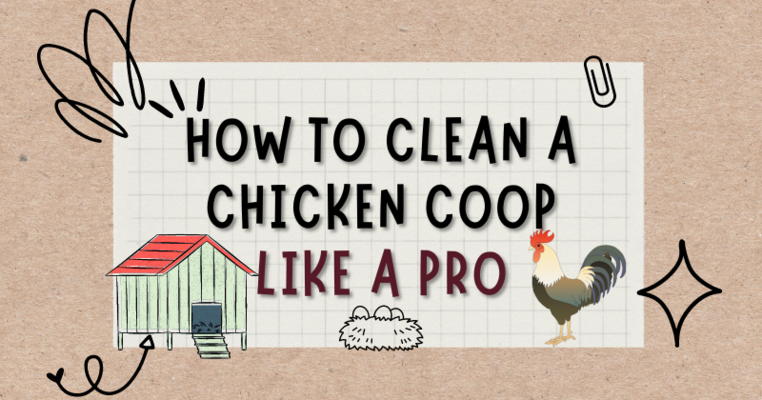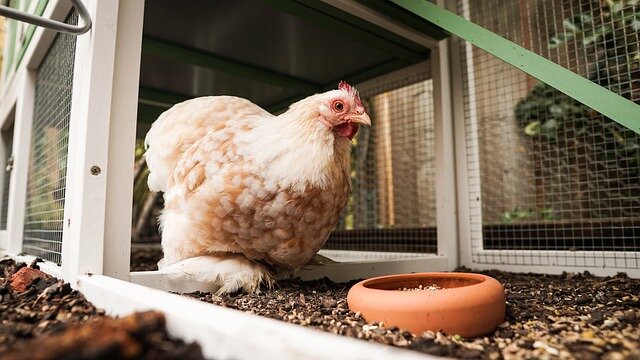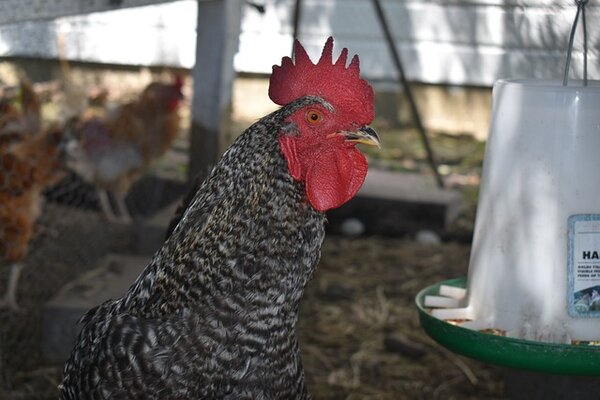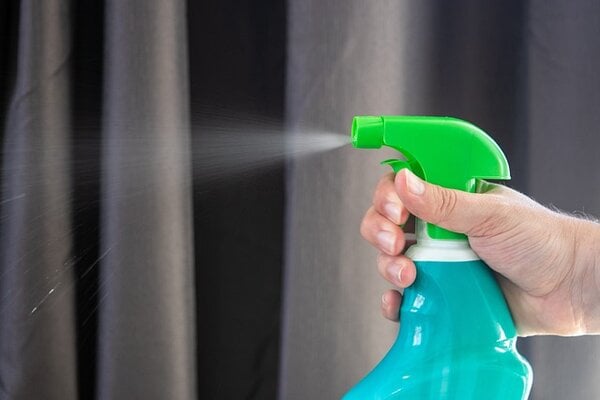The process of cleaning a chicken coop might seem straightforward to you. It is, in a sense. You can, however, do a better job of cleaning your coop than simply removing all the filthy bedding if you wish to deter flies, protect your flock from illness, and stay inconspicuous to your neighbors.

This part will tell you why it's important to keep your coop clean for your flock and you before you proceed. In spite of the fact that your chickens probably have lower hygiene standards than you do, sanitizing a chicken coop is important.
As you clean the coop more often, less dirt accumulates, and the cleaning takes less time. In any case, why should a coop be cleaned, and how tidy should it be?
Chicken coops need to be cleaned for a variety of reasons, including wellness & cleanliness. In addition to maintaining chicken health & wellness, keeping the coop clean can also reduce mite infestations. To understand the benefits for your flock, first consider its significance to you.
Chickens scratch on the ground as part of their normal behavior. The disease can spread if a chicken eats a sporulated oocyst in an affected chicken's feces. Despite Coccidiosis being treatable, you can help avoid contamination by controlling the waste.
Dirt build-up on the coop can be caused by feed scraps, droppings, and dirty bedding. When all the dirt has been removed, you can start washing the coop out. Make sure any stuck-on debris is softened with water before you scrape it off.
Please note that the use of DE is controversial among chicken owners regarding its benefit in coop/flock management. Some are for and others are against its use - so use your own judgment.

Now that you know how to clean a chicken coop, you can follow a schedule to ensure a healthy flock. This routine must be modified based on the chickens' and coop's requirements. This detailed schedule will help you get started with backyard flocks if you're new to them.

If you follow one of these tips below, you may be able to reduce the amount of energy & time you spend on essential tasks, or perhaps you may be able to save some money. Now you shouldn't have to worry about how to clean a chicken coop.
Reinstall the tarp after disinfecting it. That's it! You've got a clean coop and dry ground!
Composted litter in the enclosure provides comfort for the flock. To try the deep litter method, make sure your coop is fresh & clean.
Chicken Coop Cleaning Tools
Cleaning a chicken coop requires extra materials to protect yourself and effectively remove dirt & germs. As you'll be cleaning your coop from top to bottom, it would be best if you secured your flock beforehand. In order to clean a chicken coop, the following equipment is recommended.- A pressure washer or hose and a spray bottle
- Protective gear like a mask, work gloves, rubber boots, and goggles.
- A broom, rake, shovel, brush, and scoop.
- Bucket, sponge, tissue paper, towels, and some garbage bags.
- Important repair tools like hammers, nails, pliers, sealant, wires, and lumber are needed.
Importance of Maintaining a Clean Chicken Coop
This part will tell you why it's important to keep your coop clean for your flock and you before you proceed. In spite of the fact that your chickens probably have lower hygiene standards than you do, sanitizing a chicken coop is important.
As you clean the coop more often, less dirt accumulates, and the cleaning takes less time. In any case, why should a coop be cleaned, and how tidy should it be?
Chicken coops need to be cleaned for a variety of reasons, including wellness & cleanliness. In addition to maintaining chicken health & wellness, keeping the coop clean can also reduce mite infestations. To understand the benefits for your flock, first consider its significance to you.
Your Flock's hygiene
Healthy flocks thrive in healthy environments. Keep your chickens healthy by avoiding fecal pollution that can lead to diseases & germs. Additionally, prevent the transmission of fowl viruses to humans for the safety of your family.Disease Prevention
Disease prevention will always be more effective than disease treatment. Keeping the chicken coop clean is another great reason to do so. Among flocks of laying hens, coccidiosis develops rapidly.Chickens scratch on the ground as part of their normal behavior. The disease can spread if a chicken eats a sporulated oocyst in an affected chicken's feces. Despite Coccidiosis being treatable, you can help avoid contamination by controlling the waste.
Odor Control
Besides being a nuisance to your neighbors, a dirty chicken coop stinks. You'll have fewer odor problems if your coop has quickly accessible cleaning trays. The more often you remove and clean them, the less odor you'll have. The removal of chicken poop prevents parasites & diseases from infecting your flock. Rats are another reason to keep the coop clean. Generally, rats are attracted to coops because of the odor and the chicken feed.How To Clean A Chicken Coop In Five Steps

Empty the coop
Nest boxes, feeders, waterers, and any other detachable objects should be removed and cleaned with a chicken-safe solution. You may also remove dirty bedding. The coop can now be cleaned using the above equipment.Dirt build-up on the coop can be caused by feed scraps, droppings, and dirty bedding. When all the dirt has been removed, you can start washing the coop out. Make sure any stuck-on debris is softened with water before you scrape it off.
Disinfect the coop
The coop can be disinfected once all the dirt has been removed. A non-toxic cleaner that can be purchased at poultry supply stores or a homemade disinfectant solution can be used. Don't use bleach. Vinegar or baking soda can be used instead. Both products have eco-friendly cleaning properties and are non-toxic. Following the procedure, allow it to air dry.Inspect the Coop for damage
Examine your coop for damage while it is drying. Inspect the nesting boxes, the walls, and the roof for holes and leaks.Diatomaceous earth
It may be a good idea to apply and spread Diatomaceous Earth (DE) on the ground after the coop has dried thoroughly. The use of Diatomaceous Earth may be excellent for keeping your flock free of parasites.Please note that the use of DE is controversial among chicken owners regarding its benefit in coop/flock management. Some are for and others are against its use - so use your own judgment.
Move everything in again
Now that you've provided a healthy & clean home for your chickens, it's time to reoccupy it. Be sure to clean the coop's equipment before bringing it back in. Refill feeders and waterers and replace bedding to provide a comfortable environment for your chickens.How Often Should You Clean A Chicken Coop?
Now that you know how to clean a chicken coop, you can follow a schedule to ensure a healthy flock. This routine must be modified based on the chickens' and coop's requirements. This detailed schedule will help you get started with backyard flocks if you're new to them.
Daily
- Feeders & waterers should always be clean and free of debris, such as feathers, droppings, and other foreign objects.
- Rearrange nesting boxes and collect eggs once per day.
- Make a quick inspection of the flock. It is possible for sanitary problems to show up as health problems.
Weekly
- Waterers and feeders should be disinfected. Waterers can quickly accumulate algae & dirt. Feeders should also be cleaned of moist and clumpy chicken feed.
- Brush or wipe the roosts to remove any droppings that have accumulated.
- Refill nesting boxes with bedding as needed.
- Make sure the coop is free of damage by performing a visual inspection and repairing any natural wear or predator-induced damage you find.
Monthly
- It is important to replace damp bedding to avoid health risks. Don't disturb a brooding hen's box, however.
- Get rid of extra manure by raking the ground and flattening it.
- The vents & windows should also be cleaned regularly for proper ventilation, as dust and cobwebs can accumulate quickly.
Half-yearly
- It is often possible to complete a deep clean twice a year in a few hours if the above schedule and plan are followed. During the autumn or spring season, when the weather is favorable, general cleaning is most effective.
- Put the debris in a compost bin after you remove it with a shovel. By spring, you'll be able to put the manure in the garden.
- The coop should be cleaned and dusted. Before rinsing the coop, remove all loose dust from all corners.
- Perches & nest boxes should be brushed. It is important to scrub those areas that have accumulated feces.
- You may use baking soda or white vinegar instead of bleach if possible. Before replenishing with fresh bedding, allow all surfaces to completely dry.
Five Effective Tips for Cleaning Your Chicken Coop
If you follow one of these tips below, you may be able to reduce the amount of energy & time you spend on essential tasks, or perhaps you may be able to save some money. Now you shouldn't have to worry about how to clean a chicken coop.
Make use of tarps
Cover the floor of your chicken coop with a clean and dry tarp and add your preferred bedding, except for sand. Take the tarp and used bedding to the compost pile when it's time to clean.Reinstall the tarp after disinfecting it. That's it! You've got a clean coop and dry ground!
Deep litter method
Okay, so this is the best method since it allows you to collect the least amount of poop possible while still providing the flock with extra warmth. With deep litter, you start with a solid foundation & let the litter grow up & decompose directly on the floor.Composted litter in the enclosure provides comfort for the flock. To try the deep litter method, make sure your coop is fresh & clean.





